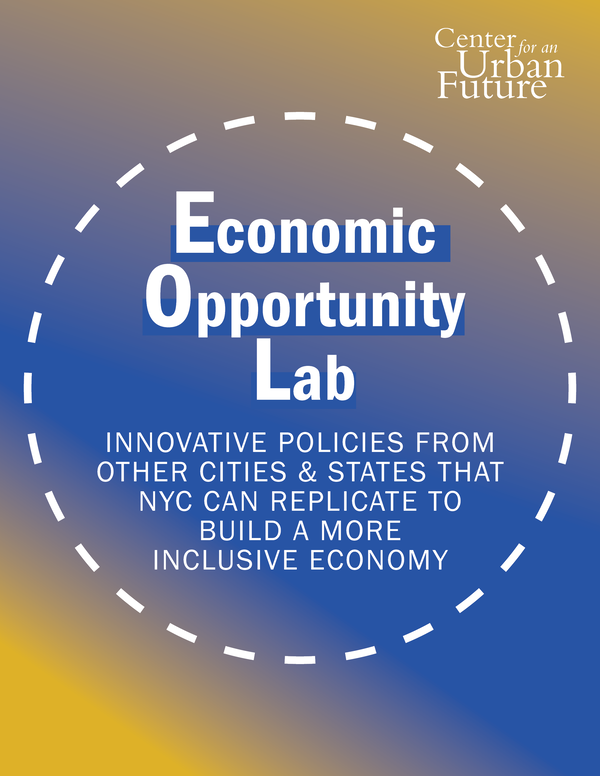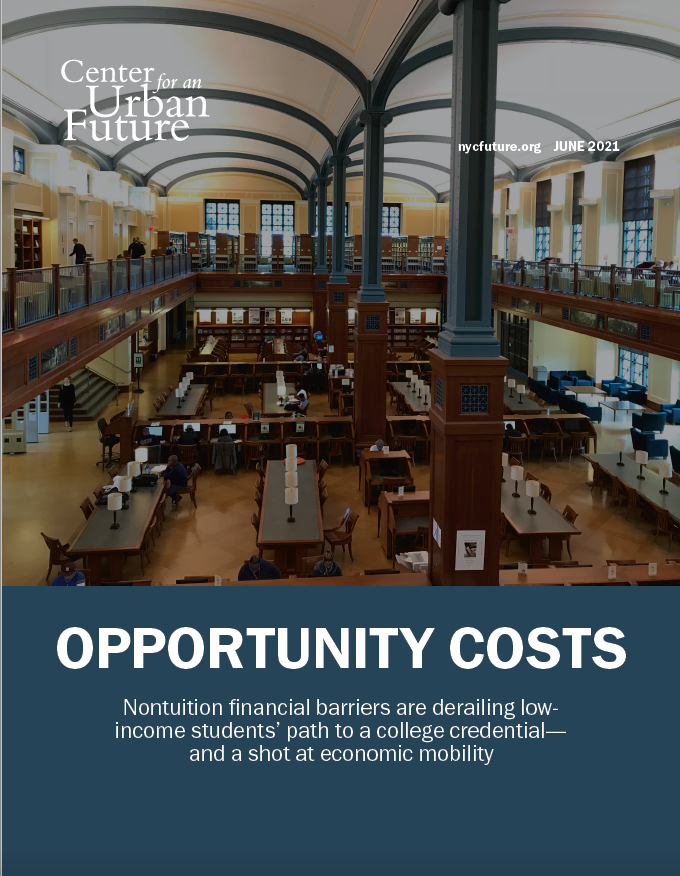Testimony of Melissa Lent
Researcher, Center for an Urban Future
Before the New York State Assembly
Higher Education Committee Hearing
on the New York State Tuition Assistance Program
November 28, 2023
Good morning. I’m Melissa Lent, researcher at the Center for an Urban Future, an independent think tank focused on creating a stronger and more inclusive economy in New York. Thank you to Chair Fahy and members of the committee for the opportunity to testify today.
Over the past 25 years, the Center has authored numerous reports detailing concrete opportunities for New York State to expand pathways into the middle class by helping more New Yorkers earn postsecondary credentials.
Arguably no state program has been more effective in achieving this goal than the New York State Tuition Assistance Program (TAP). We commend the legislature for its ongoing support of TAP, which has grown to become one of the largest and most generous tuition assistance programs in the nation.
At the City University of New York (CUNY), TAP is a key reason why three-quarters of all graduates leave CUNY with $0 in debt and approximately two-thirds of all in-state undergraduate students attend CUNY tuition-free.
In many ways, TAP is the engine that powers CUNY’s economic mobility machine. And changes made in recent years have made that engine even more powerful.
Most significant among these changes is the expansion of part-time TAP eligibility to undergraduate students and those enrolled in non-degree workforce training programs.
As the Center for an Urban Future has shown, nearly 67,000 undergraduate students at CUNY attend school on a part-time basis—amounting to nearly half of CUNY’s community college students and more than one-third of all CUNY students.
For more than a decade, the Center has urged state policymakers to expand TAP to more part-time students and we applaud the state for making this a reality.
Other recent enhancements are also helping make TAP a more inclusive and effective program, including the $500 increase to the maximum TAP award and the restoration of TAP eligibility to incarcerated New Yorkers.
But the world of higher education is continuing to change rapidly, and TAP should continue to adapt and improve to meet the needs of today.
Many of today’s college students are juggling work, childcare, and other family responsibilities. More than 43,000 CUNY undergraduates are ages 25 and above—including more than one-quarter of all community college students. Nearly 1 in 5 community college students at CUNY is a parent. Half of all CUNY students are working during college, and of those, nearly one-third work full-time.
These numbers are poised to grow. Since the CUNY Reconnect program launched in 2022, an astonishing 26,000 New Yorkers with some college credits but no degree have reenrolled at CUNY. Fully 71 percent of the students who reenrolled this fall thanks to CUNY Reconnect are over the age of 24.
New Yorkers are also opting for short-term career training and certification programs in growing numbers, including innovative programs that combine workforce training with college credits and programs at SUNY and CUNY that offer a series of credentials aligned with in-demand jobs that also accrue credits toward degrees. But even with the expansion of part-time TAP, many New Yorkers still struggle to pay for these programs—or to afford the non-tuition costs that accompany them.
There’s a lot that New York State can do to adapt to these changes and help more New Yorkers succeed in postsecondary education and careers.
Our research finds that many of the biggest remaining barriers to a college degree are the non-tuition costs, including a MetroCard, childcare, technology, and books. As the legislature considers new initiatives that can not only expand college access but boost college completion rates, new supports to tackle these non-tuition costs should be a top priority.
In addition, state leaders can take action to further strengthen TAP into the most effective and inclusive tuition assistance program in the nation. First, while the expansion of TAP to more part-time students is poised to help thousands of “nontraditional” students afford a college credential in New York, more can be done to support these students—including older students, student-parents, and those who attend part-time in order to hold down one or more jobs. To start, state policymakers should raise the TAP award income limit for independent single students without children. Currently, these students are ineligible for TAP if they earn more than $10,000 annually—a threshold that leaves out thousands of low-income adult learners.
Second, state leaders should boost the maximum TAP award—currently $5,665—to match the current cost of tuition at CUNY and SUNY, which is approximately $7,000 per year. This enhancement would help ensure that fewer students leave college without a credential because they can’t close the gap between their TAP award and the total cost of tuition.
Third, policymakers should consider options for offering additional semesters of TAP eligibility. Currently, the vast majority of TAP-eligible students are only able to receive TAP for up to eight semesters. This is a particular challenge at CUNY, where only 35 percent of full-time, first-time students graduate within four years. Expanding TAP eligibility for an additional two years, as is the case with federal Pell Grants, would help thousands more mostly low-income students stay on track toward a bachelor’s degree.
Taken together, these enhancements can help make what is already one of New York’s most important opportunity programs even more powerful, effective, and inclusive.
Thank you for your support of this crucial program, and for the opportunity to testify today.





